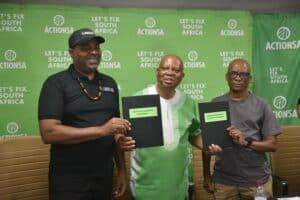The EFF voted with the DA to pass Mashaba’s first budget, in the absence of ANC councillors, who deliberately did not return after lunch.

In what Joburg mayor Herman Mashaba has described as “a watershed moment” since taking over the reins, the R59 billion City of Joburg budget for 2018-19 financial year was unanimously approved during a third council session yesterday.
This followed weeks of rejection of proposed tariff increases which had left the city unable to pass its budget on May 29, due to the Economic Freedom Fighters (EFF) abstaining on the vote.
After accepting proposed tariff increase amendments, the EFF yesterday voted with the Democratic Alliance to pass Mashaba’s first budget, without the presence of ANC councillors, who deliberately failed to return to council chambers after lunch.
Had the DA-controlled council failed to pass the budget before the end of the municipal financial year in June, it could have faced the prospect of being placed under administration by the ANC-governed provincial government, in line with the constitution.
“I am filled with mixed emotions,” a visibly relieved Mashaba said. “It is the first time my administration had to go through three council sessions to get the budget passed.”
Mashaba said he was disappointed by the walkout of ANC councillors “who have shown they do not want to work with us”.
“I am grateful to the EFF and other political parties. This budget is about the people of Johannesburg. We are determined to succeed in the economic recovery of the city.
“About 65% of this budget will go towards capital expenditure – roads, electricity provision, water, power outages, water leakages and sanitation.”
The budget, passed by a required quorum of 136 councillors, will be used towards the Integrated Development Plan (IDP), capital expenditure and the Build Environmental Performance Plan.
Among others, the council has:
- Reduced electricity tariffs to 7.17%, down from 7.37%, based on the application of the National Energy Regulator of South Africa (Nersa) municipal tariff guidelines applied to the Eskom increase of 6.84%.
- Reduced the average tariff increase on water, sewerage and sanitation by 1%, down to 13.2%, based on the Rand Water tariff increase of 12.2%.
- Reduced the tariff on sanitation services for private dwellings of an erf size up to and including 300m2 to about R196.
- Increased the residential rates rebate from R200 000 to R350 000. This will reduce the impact of five years’ worth of property value increases and ensure that 191 000 households, on the lowest end of the property market, will be exempted from rates.
- Pledged to provide free basic water to households earning no formal income. They will receive up to 15 kilolitres of water per month and 150 kilowatt hours of electricity through the City’s Extended Social Package programme.
- Provide pensioner home owners a 100% property rebate if their household income is lower than R9 245, and their property value is not more than R2. 5 million.
- Provide a 100% rebate to residents aged 70 and older, irrespective of income, with a property value of not more than R2.5 million.
- Offered a 100% rebate to residents who are on the Expanded Social Package programme, who are not pensioners and whose property value does not exceed R500 000.
For more news your way, follow The Citizen on Facebook and Twitter.






